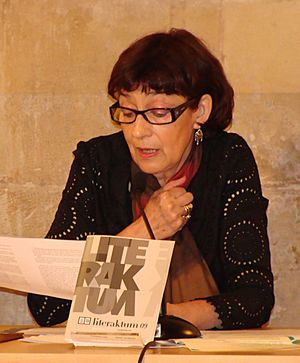Olvido García Valdés facts for kids
Quick facts for kids
Olvido García Valdés
|
|
|---|---|

Olvido García Valdés (2009)
|
|
| Born | 2 December 1950 Santianes de Pravia, Asturias, Spain |
| Occupation | Poet |
| Nationality | Spanish |
| Notable works | Caza nocturna, Y todos estábamos vivos |
Olvido García Valdés (born December 2, 1950) is a Spanish poet, essay writer, translator, and professor. She is known for her thoughtful and deep poetry. Olvido is married to another poet, Miguel Casado.
Contents
Life and Career
Olvido García Valdés studied Philosophy at the University of Oviedo. She also earned a degree in Romance Philology from the University of Valladolid. This means she studied languages like Spanish, French, and Italian.
She has taught Literature and Spanish at the Instituto El Greco in Toledo, Spain. She also taught at Sant Em de Sant Feliu de Guíxols. In 2007, she won the National Poetry Prize for her book of poems, "Y todos estábamos vivos" (And we were all alive).
In 2008, Olvido retired from her job as the director of the Cervantes Institute in Toulouse, France. The Cervantes Institute helps spread Spanish language and culture around the world. She often wrote for magazines like Revista de Occidente and Ínsula. She also helped lead the poetry magazine Los Infolios. She was a founding member of the editorial board for El signo de gorrión.
Her poems have been included in many collections of Spanish literature. These include "La prueba del nueve" (1994) and "Ellas tienen la palabra" (1997). Her work has been translated into several languages. These include French, English, German, Swedish, and Portuguese.
Olvido García Valdés describes her writing journey in three main parts. The first part includes her early poetry books. These are "El tercer jardín" (1986), "Exposición" (1990), and "Ella, los pájaros" (1994).
The second part of her work is mainly one book, "Caza nocturna" (1997). The third part includes her more recent books. These are "Del ojo al hueso" (2001) and "Y todos estábamos vivos" (2006). These later books often explore deep thoughts about life and death. Her writing style mixes simple, clear language with beautiful, flowing poetry. She often combines everyday observations with big ideas about life.
Published Works
Olvido García Valdés has written many books of poetry and prose. She has also translated important works by other writers.
Poetry Collections
- El tercer jardín, Valladolid: Editorial del Faro, 1986.
- Exposición, Ferrol, 1990, which won the Ícaro Literature Prize.
- Ella, los pájaros, Soria: Diputación, 1994, which won the Leonor Poetry Prize.
- Mimosa de febrero (1994).
- Caza nocturna, Madrid: Ave del Paraíso, 1997.
- Si un cuervo trajera (2000).
- Del ojo al hueso, Madrid: Ave del Paraíso, 2001.
- La poesía, ese cuerpo extraño, Madrid, 2005.
- Y todos estábamos vivos, Barcelona: Tusquets, 2006, which won the National Poetry Prize.
- Esa polilla que delante de mí revolotea, Galazía Gutenberg: Círculo de Lextores, 2008.
- Lo solo del animal, Tusquets 2012.
Prose Books
- Los poetas de la República (with Miguel Casado), Barcelona, 1997.
- Teresa de Jesús, Barcelona, 2001.
Translations
- Pier Paolo Pasolini, La religión de mi tiempo (1997).
- Anna Akhmatova and Marina Tsvetáieva, El canto y la ceniza. Antología poética (2005) (with Monika Zgustova).
Awards and Recognition
Olvido García Valdés has received several important awards for her writing.
- 1989 - Premio Esquío de Poesía en Lengua Castellana.
- 1990 - Premio Icaro de Literatura.
- 1993 - Premio Leonor de Poesía.
- 2007 - Premio Nacional de Poesía for her book Y todos estábamos vivos.
See also
 In Spanish: Olvido García Valdés para niños
In Spanish: Olvido García Valdés para niños

